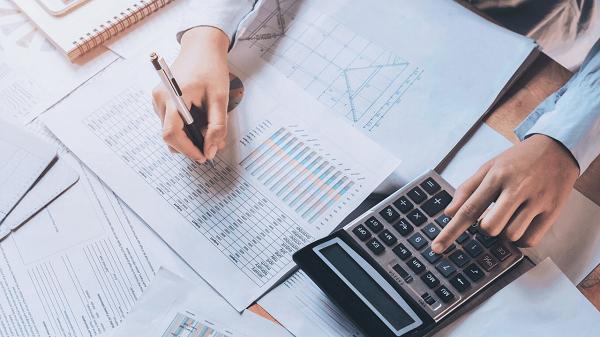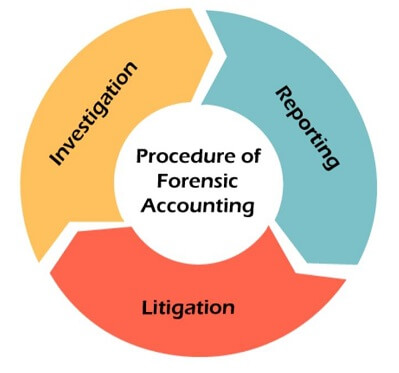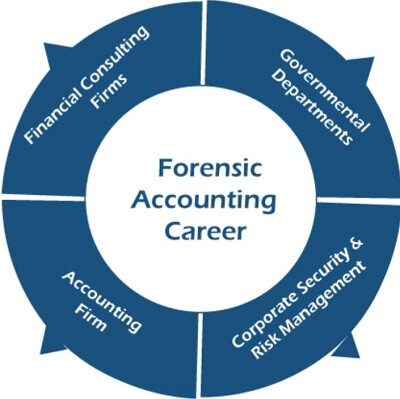Forensic Accounting
Forensic accounting is a group of accounting, auditing, and investigation skills that deals with financial conspiracies such as money laundering, embezzlement, securities funds, bankruptcy, asset misappropriation, insurance claims, family disputes, divorces, debt defaults, tax evasion, and financial frauds. These investigations are done into the finance of an individual or a business. It is also known as financial forensics.

How does Forensic Accounting Work?
Under this accounting, complex financial and business matters are analyzed, interpreted, and summarized by the accountants. They can be appointed by insurance companies, police forces, banks, government agencies, and various public accounting firms. Forensic accountants are responsible to compile financial evidence, developing computer applications so that the collected information can be managed, and communicating their findings by using various reports or presentations.
Other than testifying in the court, these accountants also prepare visual aids in order to support trial evidence. Sometimes, these accountants are required to get additional training in Alternative Dispute Resolution (ADR) so that they can do their high-level work related to legal issues and the judicial system without any error or mistake. To conduct their investigation. Forensic accountants use asset identification and recovery, tracing funds, and due diligence reviews.
Applications of Forensic Accounting
Forensic accounting is applied to investigate various misrepresentations which include the following:
- Business Fraud
Asset identification, due diligence reviews, forensic intelligence, asset recovery, suspect interviews, and tracing misappropriation are comprised of this investigation. Various intelligence measures are strategized and offenders are identified by the forensic accountants. For this purpose, they go through a detailed review of the company's different documents and books.
- Tax Fraud
Catching tax evasion is also the work of forensic accountants. Many times, it is seen that the businesses and individuals falsify their income and financial information so that they can get relaxation on tax liabilities. Forensic accounting can be applied to figure out such cases.
- Securities Fraud
One of the most common white-collar crimes is the misrepresentation of commodities, investments, and stocks. It includes various felonies such as late-day trading, pump and dump schemes, and Ponzi schemes.
- Assets Misappropriation or Hidden Assets
Another criminal activity that is done by the companies or individuals is hiding assets from tax authorities. Various misappropriations of assets including property theft, payroll fraud, and embezzlement are detected by forensic accountants.
- Partnership and Shareholding Disputes
Forensic accounting also deals with the disputes and issues created among partners or shareholders in an organization which can be related to compensations, profit distributions, or others. In such a case, the investigation is done with detailed scrutiny of accounting and financial records so that the issue can be quantified which is the cause of the conflict.
- Insurance Claims
It is often seen that many companies or individual make a false insurance claim to get the benefit. It involves the protection of their assets. These claims are difficult to disprove such as theft or a staged home fire. The validity of such claims is checked by forensic accountants by going through all the facts related to the claim.
- Economic Losses and Bankruptcy
Business losses include breach of contract, trademark infringement, product liability claims, construction claims, etc. Forensic accountants measure these losses and determine the reasons behind them. After determining the reason, they work on the corrective measures and recovery procedures (particularly in the case of bankruptcy).
- Money Laundering
Forensic accounting is also applied to identify the illegitimate sources of money, i.e., money laundering practices, and undisclosed bank accounts.
- Marital and Family Disputes
Apart from investigating frauds and misappropriation done by the companies and individuals, forensic accountants also quantify losses and assess financial compensation for divorces, property disputes, and family disputes. The compensation is quantified for alimony and child support. The property distribution is also done by these accountants in case of family and property disputes.
- Terrorism and Counterintelligence
One of the most common forms of terrorism, counterintelligence, and threat in today's world is cybersecurity. Forensic accountants are responsible to deal with these issues also. These attacks can be reduced by maintaining financial security and tracking money carefully.
Procedure of Forensic Accounting
A forensic accountant is more responsible than auditing the financial statements. There is a unique protocol followed in each situation. This process includes an initial investigation, information reporting, and final litigation. The points explained below provide information about these steps of investigation and the importance of the specialized skills of forensic accountants during the process of research.

1. Investigation
This is the first step in the process of forensic accounting. Under this step, the forensic accountant begins an investigation and collects required data when he/she found anything fraud suspicious. They present the data and discrepancies with red flags to indicate fraud. To collect more information and find out the individual against the fraud, the accountants can also interview the staff at an organization.
Then, they form a hypothesis on the basis of that gathered information so that a follow-up plan can be made to continue to assess the business. Once this step is completed, the forensic accountants hand over the information to the company and move for the next action.
2. Reporting
After collecting information and forming a case, these accountants present a summary of their findings to the necessary personnel. With the help of this information, they determine how the fraud occurred and who the main culprit is? Then, they decide how to handle the case and suggest the necessary steps to the company that should be taken.
Additionally, they can suggest ways to prevent such incidents in the future by strengthening internal security and figuring out red flags. After submitting their reports, these accountants get ready to present their points and role in the court for further processing related to the case.
3. Litigation
This is the final step in this process. It involves the participation of the accountant as an expert witness in the incident's court case. The findings are presented in the court as the evidence by the investigators and are testified against the offenders.
They present the evidence and interpret the financial documents of a firm in an understandable manner. This means the duty of the accountant is not just limited to collecting the documents but also to use rhetorical questions that make sense to the court and the point strong. Once this step is completed, the court goes for the final decision on the situation. Hence, the forensic accountant plays a huge role throughout the process.
How to Become a Forensic Accountant?
To become a Certified Forensic Accounting Professional (CFAP), one must have completed a bachelor's degree which is the minimum qualification required to be eligible for the examination of CFAP. Financial accounting offers strong job growth with above-average salaries. So, one can make an attractive carrier in forensic accounting by following the steps described below:

1. Enroll in an Accounting Program
To ensure their entry into the field of forensic accounting, first of all, the candidates must enroll in an accounting course or bachelor's degree. The process of choosing a program in the relevant field and completing the application can go for several weeks or months. While evaluating accounting programs, the students should make sure whether the college is offering forensic accounting concentration or many electives in the same.
2. Complete Specialized Course in Forensic Accounting
During the bachelor's degree, the aspirants should take as many classes in forensic accounting as possible. For this purpose, the program selected should have a concentration major focused on the same field.
3. Earn Your Bachelor's Degree
Most full-time students take four years to complete their bachelor's degree with a major focus on forensic accounting. After, completing this degree, they get eligible for the entry-level position in the field of forensic accounting.
4. Go for a Master's Degree
A bachelor's degree is the minimum educational requirement in forensic accounting but it is not enough to get a high-paid job in the field. Most of the reputed companies prefer candidates with master's degrees or graduate certificate holders. A master's in forensic accounting provides the students with additional and advanced knowledge and skills in forensic accounting.
Other than the degree, some certificates including the CPA credential need credits beyond a bachelor's degree. Generally, it takes two years to complete a master's degree while passing all parts of the CPA exam may take 18 months.
5. Search Job Opportunities
After completing both degrees, the candidates can search for a job opportunity. It can be more beneficial for the aspirants to complete an internship while in the school because it makes the resume more attractive, increases experience, and demonstrate their skills to potential employers. To stand out from others, the certification can also be useful.
6. Get Certification
After getting the job, the candidates can pursue a certification in forensic accounting along with their job to get advanced skills. Some certifications demand examinations with multiple parts that can go for several months. Certification also requires work experience in the same field. This can help the candidates in getting a promotion or higher designation in the same company or a job in another company with a more attractive package.
Advantages of Forensic Accounting
- Solve Financial Crimes
Financial accounting plays a huge role in solving financial crimes. These crimes include bribery within government departments as well as fraud and money laundering within various business entities. This accounting gathers evidence related to the crime and then detects and identifies them.
- Monitor Professionals
Forensic accounting helps in assessing the work of professionals along with accountants themselves. The findings get from this are used to file professional negligence claims against those who made critical errors.
- Deals with Financial Issues
Organizations can use this accounting to detect anomalies among their staff and with third parties which are linked with the business.
- Minimized Losses
A strong forensic accounting helps in minimizing and preventing unnecessary financial losses. Fraudulent activities and general financial discrepancies generate extraordinary costs to the business every hour. Forensic accounting helps in avoiding such costs.
- Avoidance of Legal Problems
It is spectacularly disruptive and costly for the company to deal with instances of fraud whether it is internal or external. Forensic accountancy prevents the organization from such scenarios by investigating fraudulent activities and nipping any issues detected in the bud.
- Improves Brand Reputation and Authority
If a company can be easily manipulated and fraud can take place in it then it will be very difficult for the employees as well as customers to respect, trust, and work with such an organization. Fraud and other criminal activities within the company can cause reputational damage that is borderline impossible to repair. This increases the value of forensic accounting.
Challenges in Forensic Accounting
Forensic accountants may face the following issues while dealing with the problems:
- The procedure of investigation in forensic accounting demands a lot of technical and financial knowledge and perfection.
- Sometimes, the information can be highly confidential and can affect the goodwill of the suspect if gets leaked.
- Even if the suspect got proven not guilty, employees and customers remain suspicious which can affect the profit and production of the organization.
- The process of investigation under this accounting is of long duration hence, can be very expensive as well as time-consuming.
- If there is mere speculation of an alleged felony, unwanted negative publicity can get generated.
- Forensic accounting can generate distraction among the employees particularly when an outside accountant is hired and can also make them feel like their integrity is doubted which can lower their morale. It can also affect the normal routine of the personnel which can further affect their productivity and efficiency.
Difference between Forensic Accounting and Auditing
It is often seen that people get confused between forensic accounting and auditing. But they are completely different streams. The difference between them can be understood with the help of the table given below:
| Basis of Difference |
Forensic Accounting |
Auditing |
| 1. Purpose |
This accounting analyzes the financial documents to detect any illegal activity within an organization specifically fraud or felony done by high profiled employees. |
Auditing deals only with the books of accounts compliance with GAAP. It is the examination or inspection of various books of accounts followed by inspecting the inventory physically to check whether all the departments are working according to the recorded transactions or not. |
| 2. Objective |
The objective of forensic accounting is to detect frauds and felonies done by an organization or individual. |
The objective of auditing is error identification and prevention. |
| 3. Process |
Investigation follows a specific pattern and looks for outliers. |
It works with a predefined and systematic process of reviewing accounts by applying GAAP and Company's Act, 2013. |
| 4. Investigation |
Forensic accounting scrutinizes every detail during the procedure of investigation. |
Auditors analyze the financial transaction samples of the company. |
| 5. Litigation Perspective |
In this accounting, the investigation is documented and presented in a court of law. |
It does not require any litigation perspective. |
| 6. Skill Set |
Forensic accounting demands knowledge or skills beyond accounting. It requires criminalistics, advanced data analytics, information technology, and law. |
An auditor must have knowledge of accounting. |
| 7. Frequency |
There is not any fixed frequency of this accounting and hence is uncommon, i.e., done only when something or somebody is suspected of fraud. |
Auditing is done regularly by the company at a fixed period. The companies are mandated by law to appoint an auditor and get checked their books of accounting. |
| 8. Carried Out By |
Forensic accountants are carried out by a professional team of experts, including CPAs. |
Auditors are carried out by Certified Public Accountants (CPA). |
| 9. Appointed By |
These accountants are appointed by directors, owners, third parties, and counsels. |
Auditors are appointed by company shareholders. |
|



 For Videos Join Our Youtube Channel: Join Now
For Videos Join Our Youtube Channel: Join Now










